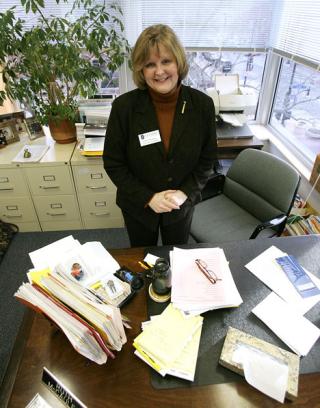A helping hand

February 10, 2006
In a unique program that has been in effect for thirty-six years, the Emergency Dean is a resource for students that is both over looked, and highly successful.
Dealing with a vast amount of student issues, the Emergency Dean service is comprised of a team of professionals and volunteers that assist the student body on topics from absences, accidents, referrals, and even deaths.
Acting Dean of Students Ruth McCauley said that the University of Illinois and technology has come a long way since the inception of the program. “(The Emergency Dean on-call) would sit at home and answer the telephone. When we started getting pagers, we were able to be more effective,” she said.
Now, when the office closes at 5 p.m. and until they reopen at 8:30 a.m. on weekdays, the person on-call has a cell phone and important documents to help direct whatever action is most necessary for the student and possibly the student’s family. Dean McCauley is looking to use laptops to help in finding more resources.
Statistics from last year’s reports (July 2004 – June 30, 2005), the Emergency Dean/Student Assistance Program answered 678 after-hours and weekend calls. Cathy Acevedo, Associate Dean of Students, a counselor for thirteen years prior to serving as an Emergency Dean, related to the dynamics of the job. “You don’t know when the phone is going to ring. I’ve gone a week (on-call), and thought, ‘my telephone must be broken,’ and then during one winter break, the phone rang non-stop.”
Get The Daily Illini in your inbox!
In the 678 after-hours and weekend calls, 97 were mental health crises (with 52 involving suicidal gestures or ideation), 86 calls involved interpersonal or relationship violence (including 34 assaults/robberies), 17 students deaths (11 current, 1 incoming, 5 recently enrolled/graduated), and 2277 withdrawal interviews were conducted. “The student deaths ranged from accidents, chronic illnesses, and suicides,” said McCauley.
McCauley also stressed that during exit interviews, there were two areas often marked that left her concerned. One box was, “I couldn’t find anyone to help me,” and the other, “I’m lonesome and unhappy.”
“It’s easy to get swallowed up in a big university like this. Our job is to make this big place feel smaller,” McCauley said.
The University has a large amount of foreign students, graduates, professionals, as well as a very large freshman class. Naturally this diversity hosts a multitude of issues that face the on-call Deans.
The most frequent calls come in the form of absence excuses, something that secretary Diane McGraw specializes in. “I take calls, and write out absence letters. Students are required to provide documentation, (and) if they are absent for more than a week, we inform their instructors.”
Another predominant call is in the form of alcohol abuse, which the deans regard as a serious issue. They will receive calls about students found passed out from excessive drinking, and occasionally will hear from a local hospital that has had to intervene in order to keep a student breathing.
Official statistics are hard to pinpoint, because as the size of the student body increases, so do the rates of alcohol abuse.
Currently, there are 16 staff members that serve as on-call Emergency Deans. Most are professional staff, but volunteers are accepted.
However, those volunteers must demonstrate a genuine care for all students, must undergo intensive training, and usually are in the field of getting a Master’s degree in higher education administration.
The Emergency Dean service is generally regarded as a professional caring aid that is able to direct students to the proper resources.
The service works with faculty, as well. Some faculty are so dedicated with their involvement with the students, they will use the Emergency Dean program to follow up on issues. Military personnel sometimes have to deploy, and are able to call from a cell phone in order to help resolve their immediate departure from the University.
“You have to ask for help,” said McCauley.






